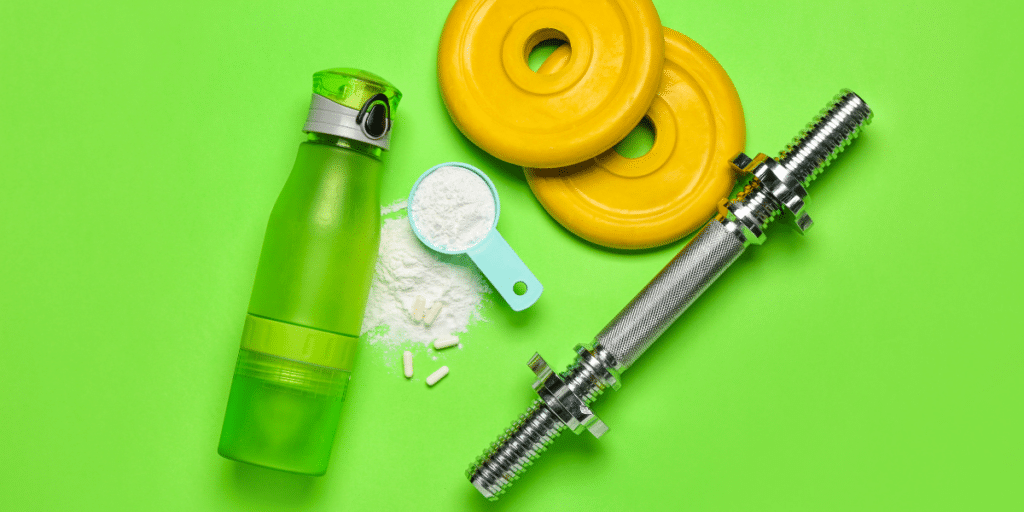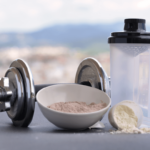If you’re strength training, you may have heard about supplementing BCAAs. BCAAs can aid you in your fitness goals whether you’re looking to bulk up, lose weight, or reduce recovery time. Educate yourself about the positive effects of BCAAs to help you determine the best way to implement them into your daily fitness plan and diet.
Jump to:
About BCAAs
BCAAs are an essential amino acid that your body needs, but cannot make on its own. Your body uses these amino acids as building blocks to create protein.
Many athletes supplement BCAAs, while others ingest them through their diet alone. BCAAs can be found in sources of protein, like eggs and meat. These crucial amino acids don’t just help with muscle growth and athletic performance—they have numerous benefits that can improve your overall health.
What Does BCAA Stand For?
BCAA stands for branched-chain amino acids. The term “branched chain” refers to the chemical structure of the three amino acid components in BCAAs—leucine, isoleucine, and valine.
What Are BCAA Supplements?
BCAAs are essential to your body’s needs, but your body doesn’t make them on its own. It’s crucial to absorb BCAAs through your diet.
BCAA supplements usually come in powder form and can be mixed into a drink. The best supplements for burning fat have a ratio of leucine to isoleucine and valine of 2:2:1.
Why Should You Take BCAAs According to Science?

Numerous studies support that taking BCAAs stimulates muscle growth, helps prevent burnout during a tough workout, and aids in muscle recovery. Supplementing BCAAs can even promote weight loss and help with immune support. Let’s take a deep dive into the many benefits of BCAA supplementation.
Potential Weight Loss
We know there is no “magic pill” that sheds unwanted pounds for you, but pairing BCAAs with strength training has proven to be effective in assisting with weight loss. BCAAs increase your stamina which can help you have long and efficient calorie-burning workouts. They can also help burn fat by boosting metabolism, and can even help reduce sugar cravings.
Promotes Muscle Growth
BCAAs are the building blocks of proteins, and muscles can’t grow without them. Studies have shown that leucine, one of the 3 branched-chain amino acids, aids in protein synthesis. Muscle protein synthesis repairs muscle damage caused by intense workouts and ultimately builds muscle.
Branched-chain amino acids can also help fight fatigue during exercise, which makes for more productive workouts. BCAAs are also known to decrease muscle soreness, which means you need less recovery time between hitting the gym.
More Energy During Workouts
Another perk of BCAAs is it can help you feel more, well, perky! BCAAs decrease the buildup of tryptophan. Tryptophan is an amino acid that converts to serotonin, which is notorious for inducing sleepiness. Having more energy during workouts allows you to increase your reps and can even help keep your form in check without becoming overly fatigued.
Improved Liver Function
The liver is the largest organ in the body and it processes amino acids into their most useful form through protein digestion. Unfortunately, liver disease is the cause of nearly 2 million deaths per year, worldwide.
A main cause of liver disease is altered amino acid metabolism. Research shows that supplementing BCAAs delays the progression of chronic liver disease and can reduce liver fat.
Reduced Muscle Breakdown
Muscle protein synthesis refers to the process of muscles rebuilding after they break down. Muscle breakdown, also known as muscle wasting, occurs when breakdown exceeds muscle protein synthesis. It’s imperative to replenish BCAAs and other essential amino acids to the muscles during recovery time to slow or even stop the progression of breakdown.
Decreased Fatigue and Soreness After Exercise
You’ve probably experienced muscle soreness on the days following a strenuous workout. Perhaps you’ve been so sore that your next workout was less than productive because you could lift your arms. The discomfort may have even caused you to exchange your next training session for another rest day.
Implementing BCAAs can reduce these kinds of problems from interfering with your training schedule. They are proven to decrease muscle damage and lessen muscle soreness.
Immune Support
Just like they aid your muscles in recovering after a long workout, BCAAs also support your immune system. Branched-chain amino acids can protect your immune system by improving the body’s use of antioxidants and reducing inflammation.
Vigorous, high-volume exercise, like a marathon runner or triathlete might experience, can actually weaken the immune system. BCAAs assist in the production of immune cells and can help the immune system recover more quickly after working out.
When Is the Best Time to Take BCAAs?

The best time to take BCAAs depends on your fitness goals. Because BCAAs can improve endurance, some athletes choose to take BCAAs before they workout. BCAAs also help with muscle recovery, so many take them as a post-workout supplement.
Benefits of Taking BCAAs Before or After Working Out
There are many benefits to taking BCAAs before your workout as a pre-workout supplement. BCAAs decrease muscle fatigue and enhance endurance, making it so you have more energy during exercise. BCAAs peak about 30 minutes after consumption, so plan accordingly.
Taking BCAAs after a workout is also beneficial as they aid in muscle recovery, reduce muscle catabolism, and help reduce sore muscles.
Ideal Window of Opportunity for Muscle Growth
The 30-60 minutes after exercise is considered the optimal time to consume nutrients to maximize health benefits and muscular gains. Also known as the “anabolic window” many consider it to be a crucial time to supplement to kickstart muscle protein synthesis and replenish glycogen stores in the body.
How Much BCAA Should You Take?
The amount of BCAAs you’ll want to consume depends on your fitness level. Adults can safely ingest up to 20 grams of BCAAs in divided doses per day. If you’re taking BCAAs for the muscle recovery benefits, you can consume a lower amount.
Those that have an intense workout regime may want to consume more. Aim to take 2-3 grams of leucine, about 2.2 grams of isoleucine, and 2 grams of valine per day.
How Often Should You Take BCAAs?
When BCAAs are consumed in small doses throughout a long training schedule, they help prevent muscle fatigue and breakdown. It’s safe and beneficial to consume BCAA daily, in divided doses.
How Long Does It Take to See Results from Taking BCAAs?
As with most supplements, you’ll need to commit to taking BCAAs habitually for an extended period before seeing results. You may start feeling the effects of BCAAs at around 10 days of use. Pair BCAA supplementation with a healthy diet to see quicker results.
Additional FAQs About BCAAs

You may still be on the fence about whether or not BCAAs are for you. Here are some common questions concerning the use of BCAAs.
Should You Take BCAAs on a Full or Empty Stomach?
You may take BCAAs before or after eating. If you practice fasted cardio training (training while fasting) supplementing BCAAs before workouts on an empty stomach can bolster energy levels and help you with endurance. It’s also beneficial to take BCAA supplements between meals, about 1.5-3 hours after eating.
Should You Take BCAA on Rest Days?
Yesterday’s gym session is today’s sore biceps. Continuing the use of BCAAs, even on rest days, proves to help with delayed onset muscle soreness. After all, aside from boosting muscle growth, BCAAs play a crucial role in muscle recovery and reducing muscle soreness. So enjoy your rest day from the gym, but don’t skip taking your BCAAs!
Do BCAAs Help Burn Belly Fat?
Good news—many studies confirm that an intake of BCAAs does contribute to greater fat loss, including belly fat. Pairing BCAAs with resistance training bolsters your workouts, shortens recovery time, and builds more muscle mass. The more muscle mass you have, the more fat you burn. It should be noted that BCAA supplements are more effective at burning fat than whey protein.
Is It Okay to Take BCAAs Without Working Out?
While it won’t hurt you to take BCAAs without heading to the gym after, it also won’t be very beneficial. The numerous benefits of BCAA supplementation are directly linked to elevating workouts. We’ve learned how these amino acids help with both muscle recovery and muscle repair. When you take exercise out of the equation, you take away some of these fantastic benefits.
However, it can still be useful for increasing energy levels. Many gym-goers turn to BCAAs because the body can tap into the energy source that amino acids bring during intense physical activity. You can still feel increased energy after taking BCAAs, even without getting your sweat on.
Can You Mix BCAAs With Creatine or Protein?
Mixing BCAAs with creatine or protein isn’t just allowed, it’s encouraged. Creatine enhances muscle strength and size, and whey protein can help with the growth of lean muscle mass. Adding 5 grams of BCAAs to your whey protein should sufficiently get your muscle protein synthesis rolling. Stacking all three of these things together can help you bulk up without burning out.















